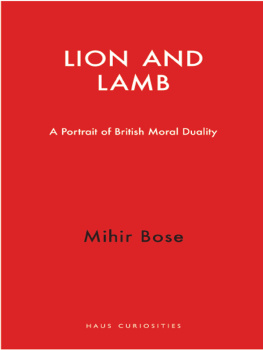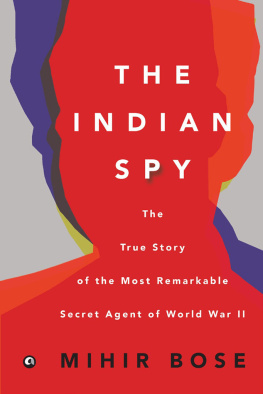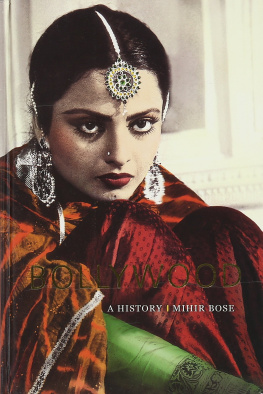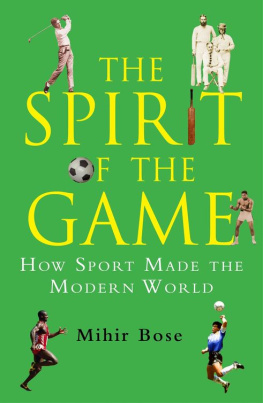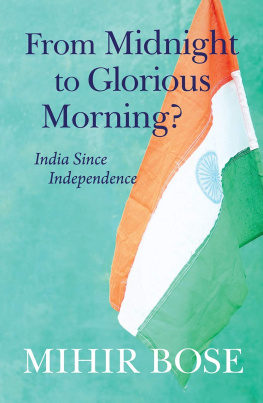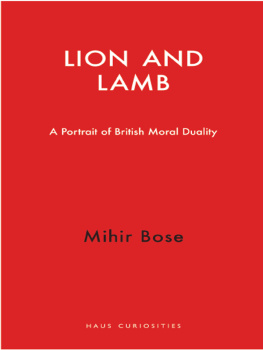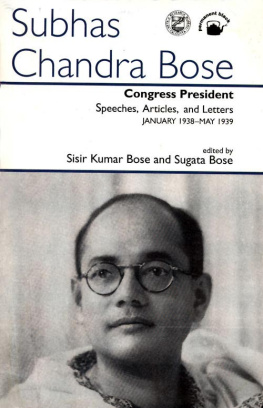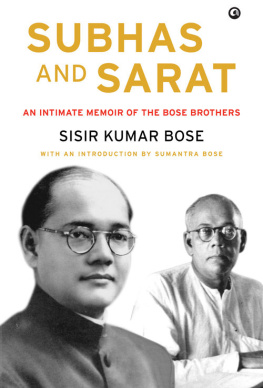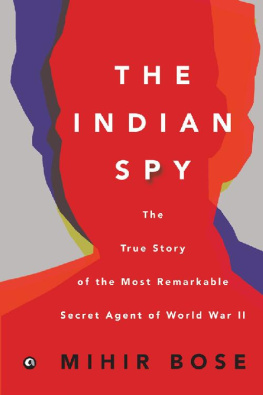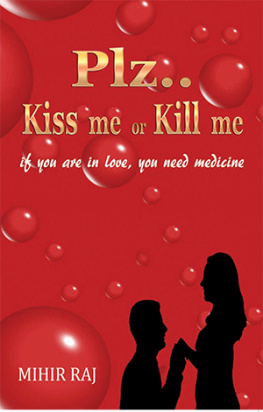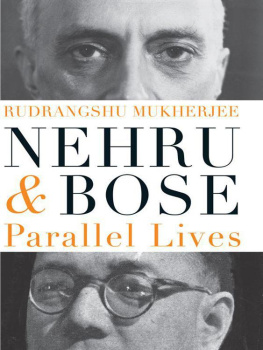First published by Haus Publishing in 2018
4 Cinnamon Row
London SW11 3TW
www.hauspublishing.com
Copyright Mihir Bose, 2018
The right of the author to be identified as the author
of this work has been asserted in accordance with
the Copyright, Designs and Patents Act 1988
A CIP catalogue record for this book is
available from the British Library
Print ISBN: 978-1-912208-04-3
Ebook ISBN: 978-1-912208-03-6
Typeset in Garamond by MacGuru Ltd
Printed in Spain
All rights reserved
Acknowledgements
This book came about as a result of a conversation with Barbara Schwepcke, who thought it might make an addition to the Haus Curiosities series if I could persuade Lord Peter Hennessy, whose brainchild the series is. To my surprise and delight I could, and what is more I got a delightful lunch at the House of Lords. Following that, Harry Hall kindly agreed to give me a contract maybe because I am, like him, a Tottenham sufferer. So, my thanks to Barbara, Peter and Harry. And to Jo Stimpson for her excellent editing. My thanks also to Jeremy Butterfield and to Rose Chisholm, without whose assistance the book would never have been completed. As usual, I cannot thank my wife, Caroline, enough.
A note on language
In the course of relating incidents of racially aggravated harassment, I have quoted statements using language that readers will find offensive. The publisher and I agree that the reproduction of this language is necessary to faithfully represent events as they occurred.
The lion and the ostrich
In the summer of 2014 my wife and I decided to have a short break in Yorkshire. I had been to Yorkshire often, but mostly on journalistic assignments to cities and towns. This would be a journey to the country. My wife, a proud country girl, feels I am too much of a townie, and this was a holiday to take me away from the city state of London, the modern Venice, and go for long walks through Englands green and pleasant land. However, on one of our evening walks we got lost. My wife blamed me for not allowing her to bring the up-to-date Ordnance Survey maps. Fortunately, a farmer came by in his Land Rover and very kindly offered us a lift. After we had exchanged the usual pleasantries, the talk turned to farming and how farmers felt about government policies. With the 2015 elections coming up, and David Cameron having promised a referendum on the EU if he won, I was keen to find out how the farmer would vote. He readily conceded that Europe had been good for the farming community and that he received generous EU subsidies. But he said he would vote to leave.
The money did not matter. We needed, he said, to get control of our borders. There were far too many people flooding into this country; we just could not cope. Then he looked at me and said, I can see youre from Sri Lanka. When I shook my head and said that, no, I had never even been to Sri Lanka, he said nothing and did not ask my country of origin. Then, looking directly at me, he said, I want my country back. With that he looked at my wife, who is white English, and smiled as if to say that she at least would understand why the natives of Britain felt this way. Away from London and metropolitan cities, in places where there are few non-whites, my wife is always extremely sensitive about how I am treated, but the farmer was not remotely hostile. We parted very amicably and returned to our hotel, where all the staff except one were from Eastern Europe. (The non-Eastern European one was from Australia, and about to get married to one of the Eastern Europeans.)
In the lead-up to the Brexit vote I often thought of the farmer and concluded that many, like him, might want their country back. I voted Remain but had a bet that the country would vote for Brexit. As a sports fan, I often bet against my favourite team and such bets, which I hope I will lose, are meant to provide some monetary compensation should my team be defeated. The difference this time was that, unlike sporting encounters, the referendum was not the first leg of a two-legged football match, let alone the first Test of a five-Test series. There would be only one chance at the vote. Some Remainers may hope the House of Commons, or the various investigations into how the referendum was won, could make it otherwise, but what is taken for granted in sport is not possible in politics.
The farmers cry, I want my country back, also resonated with me because I have often heard similar cries, but on a football ground. Supporters unhappy with their manager and the board shout, We want our club back! But just as a football supporter has a mystical memory of the glories of his beloved team and cannot say which period of the clubs history he wants to recreate, so the Leavers have until now failed to define which period of this countrys vast and complex history they want to go back to. I do hope that none of them want a return to the 70s and 80s, when I was called a Paki and told to go back to Bangladesh (at that stage I had not visited either country). I often walked the streets in fear, and on a couple of occasions was worried I might not live to see another day. That has long passed. This is a different country, and I do not want that old country back.
I shall have more to say about immigration. Here let me say that I came from India nearly fifty years ago, not as a refugee or an economic migrant but because I was keen to become a writer. Indeed, in leaving India I gave up a privileged life which today would have seen me retire as a millionaire while my writing, as my father warned me, has never made anything like that amount. However, it has given me much more pleasure than all the money I could have earned in India. In India, the only job I got was through nepotism, my family connections; here, I have been given opportunities not because anyone knows anything about my family they do not but because I have managed to convince media organisations and publishers that I have some ability. There have been enough good people judging me on what I can contribute rather than my skin colour.
Now, let me address the fact that what the Leavers are saying with their cry is that England should stop behaving like an ostrich and become a lion again. This is not a new cry, but one that has been heard regularly in this country since the end of the Second World War. The first time I heard it, it was certainly not uttered by a farmer, nor by anyone who would be classified as an ordinary working man, but by one of the countrys leading intellectuals:
The average Englishman [is] a much more attractive hybrid between a lion and an ostrich. In times of emergency he rises magnificently to the occasion. In between emergencies he buries his head in the sand with the tranquil conviction that reality is a nasty word invented by foreigners. This attitude is not only soothing, but also guarantees that a new emergency will soon arise and provide a new opportunity for turning into a lion and rising magnificently to the occasion.


